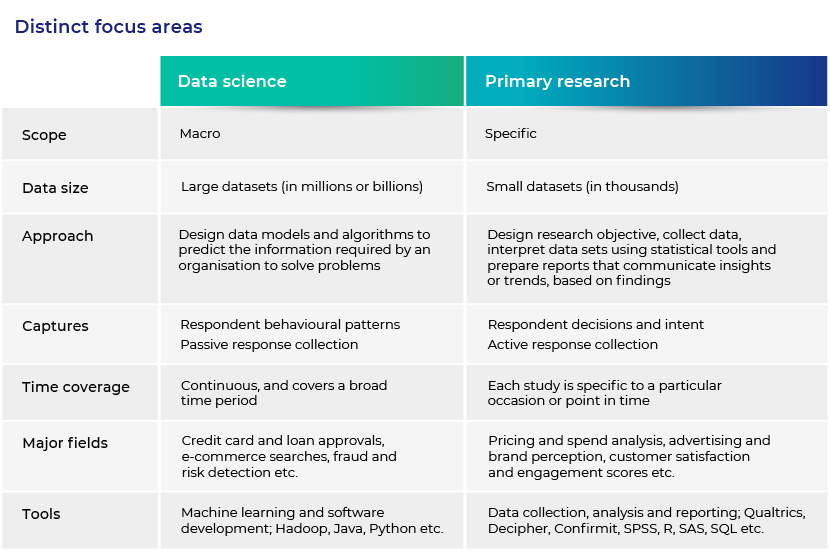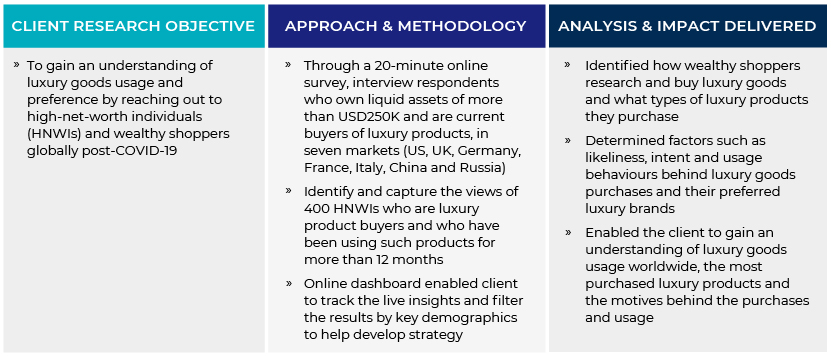Published on February 23, 2021 by Santosh Kumar
Before we answer this question, let us understand the terms data science and primary research, as well as their similarities and differences.
What is data science?
Data science is a field of study that uses statistical models, processes, algorithms and automated systems to extract actionable insights from structured and unstructured data. To generate findings, data science algorithms and models run on already collected data. The data science process involves a number of stages, including the preparation, interrogation and analysis of various data points and the presentation of results.
What is primary research?
Primary research, on the other hand, is the collection of data directly from a target group; this data can then be used for research and insights. The process encompasses steps such as the preparation of questionnaires, the collection, cleaning, processing and visualisation of data and the presentation of insights.
How has primary research become more important than ever?
COVID-19 has had an impact on everything and everyone. We have seen disruptions and changes in perceptions across industries and markets, resulting in a paradigm shift in consumer behaviour and preferences. Consequently, much of the research accumulated pre-COVID-19 may have become irrelevant. It has, therefore, become crucial for the R&D divisions of big brands to look towards primary research in order to make informed business decisions.
Primary research always starts with defining the research objectives in line with the current market environment or business need. Research conducted post-COVID-19 should include questions relevant to the present situation and customer needs and preferences. Primary research allows flexibility to design and adapt research instruments according to the research needs, making this method of data collection highly efficient.
Business impact analysis after COVID-19 is an apt example of why we cannot rely solely on big data and data science. To conduct a business impact analysis, primary research is mandatory, as it helps to understand the biases, decisions, and perceptions of all stakeholders through active questioning. Organisations can create business plans based on direct responses received from stakeholders. The data collected can be analysed and compared with in house repositories or other research findings. Data science conducted on available big data, such as customer spending behaviour, can complement the impact analysis done through primary research. Using and choosing between primary research and/or data science in line with requirements will help strategists to create a progressive business plan. Given the differences between primary research and data science, the two fields of study work complementarily and complete the research insights by providing granular and specific action items and analysis.
How primary research on luxury goods helped clients develop sales and marketing strategies after COVID-19
Because of the visible disruption in consumer spending behaviour since the COVID-19 pandemic, it is important for companies to understand how customer thoughts about their brands have evolved. Primary research is a quick and effective way to get active responses from customers on the client research objective. In the post-COVID-19 scenario, primary research has been inclined more towards computer-assisted web interviews (CAWI) and online surveys, where respondents can share their views on a 5- to 10-minute questionnaire according to their convenience, using a laptop or smartphone. Online primary research is, therefore, faster, more cost efficient and involves less administration than in-person research, particularly given the prevailing COVID-19 protocols and travel restrictions.
How Acuity Knowledge Partners can help
Acuity Knowledge Partners (Acuity) is a leading provider of bespoke primary research and data analytics. It has nearly two decades of transformation experience in servicing major clients, with a specialist workforce of analysts and delivery experts across its global delivery network. These services are supported by its proprietary suite of Business Excellence and Automation Tools (BEAT), which offers domain-specific contextual technology.
Source:
https://stage.acuitykp.com/our-impact-stories/imparting-understanding-of-luxury-goods-usage/
What's your view?
About the Author
Santosh has nearly 18 years of experience in quantitative and qualitative primary research. He is responsible for providing research and insight support to market research agencies, helping them prepare key insights for business processes.
He has successfully delivered syndicate and ad hoc projects related to diary data, pharmaceutical data, and product/concept tests. Over his 16-year tenure with Acuity, he has been responsible for conceptualising specific client needs and framing solutions to assist in business development efforts. Prior to joining Acuity, he was employed with Annik, where he delivered data analysis projects. Santosh holds a Bachelor of Commerce degree from..Show More
Like the way we think?
Next time we post something new, we'll send it to your inbox










